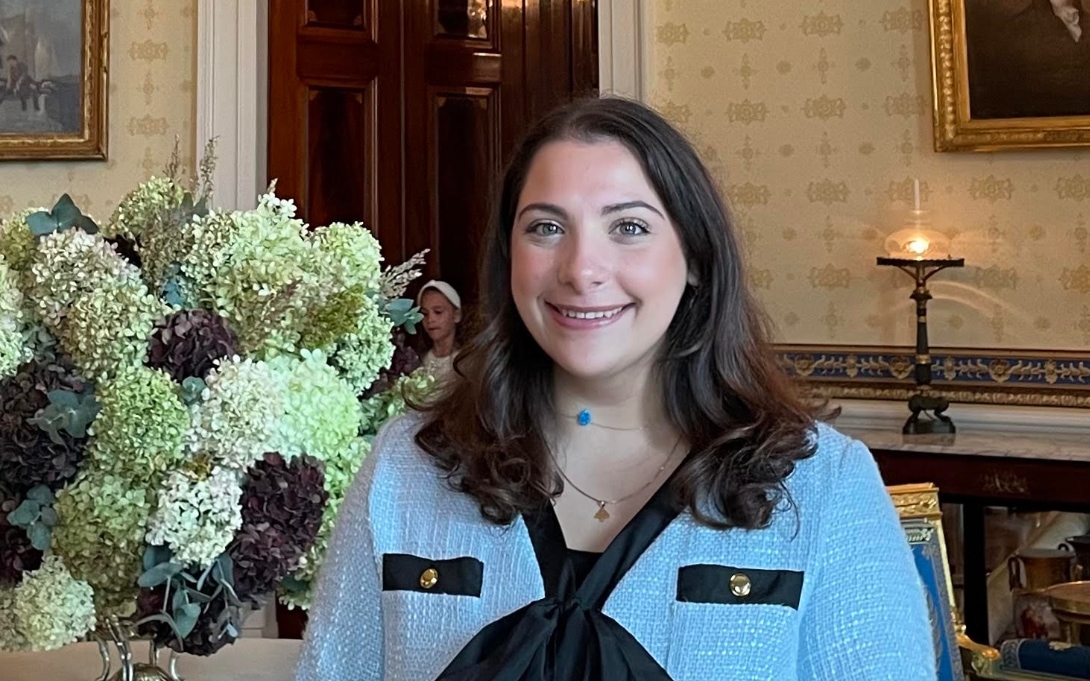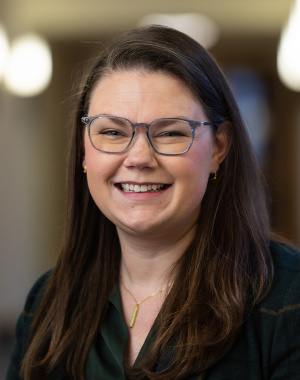
Since 2019, the Youth Policy Lab has partnered with the State of Michigan and with local school districts to place early-career professionals in government agencies to make specific, measurable improvements in policies and programs that impact Michigan’s youth, their families, and their communities. The two-year Michigan Data & Policy Fellowship bridges policy and research on a variety of topics, including maternal and infant home visiting, juvenile justice, mental health support, and postsecondary education.
“This model is uniquely positioned to deliver impacts for everyone involved,” said Megan Foster Friedman, managing director of the Youth Policy Lab. “Fellows support our public sector partners in strengthening their programs, policies, and processes, and provide context around service delivery that informs YPL's research and analysis work with those partners. In turn, Fellows gain experience and exposure to real-world policymaking and public service.”
Fellows have a diverse range of academic backgrounds and professional interests but all have completed a graduate-level degree in public policy, education, public health, social work, political science, economics, or another relevant social science discipline before beginning the fellowship.
Sara Elhasan (MPH’22) was placed with the Michigan Department of Health & Human Services (MDHHS) Home Visiting Unit, which administers programs that provide guidance, information, and resources to families with young children in the comfort of their own homes. Elhasan worked to improve information sharing and coordination across various evidence-based home visiting models. Specifically, her analyses helped to identify geographic areas that could benefit from service expansion and document how families learn about services to improve how referrals are made. Her research also helped to inform a new state initiative to boost awareness of and enrollment in home visiting services.
The Fellowship allowed Elhasan to put her technical skills, such as data analysis and visualization, into practice and contribute to tangible impact. She recently accepted a job as a public health advisor for the City of Dearborn, crediting the Fellowship—and its dynamic and multi-stakeholder learning environment—with bridging the gap between research and policy, and preparing her for the new role.
She says, “The fellowship boosted my confidence to navigate the incredibly complex public health system. It also encouraged me to look for the gaps in resources that are necessary to expand services. I’m excited to apply my knowledge and skillset to the Dearborn community.”
YPL Data & Policy Fellows are also placed with the Michigan State Court Administrative Office, Detroit Public Schools Community District, and the Michigan Department of Labor & Economic Opportunity. Read on to learn more about current fellowships.
SCAO Youth Justice Fellowship: Kaj Althaus
Kaj received his BA from U-M in 2018 and his Master of Public Policy from Penn State in 2021.
Partner: Michigan State Court Administrative Office (SCAO), Statistical Research Division
Focus: improving data collection and risk/needs assessment practices across Michigan’s county-based juvenile justice system
Key Projects:
- Juvenile financial assessments: analyzing court data to understand the use of fines, fees, and assessments within the juvenile justice system to inform potential changes to financial assessment practices
- Data landscape analysis: documenting gaps and opportunities to standardize and streamline data collection practices statewide
- Risk/needs assessments: exploring publicly available tools to assess juvenile risks and needs, with the goal of recommending the use of a single assessment tool across the state of Michigan
DPSCD Mental Health Fellowship: Megan Jagolizer (MSW’23)
Partner: Detroit Public Schools Community District (DPSCD), Division of Whole Child Support
Focus: improving mental health outcomes among DPSCD students
Key Projects:
- Universal wellness screener: analyzing patterns in student mental health data to help district staff understand patterns and inform mental health programming
- TRAILS implementation support: working with 70+ school buildings to support the implementation of TRAILS mental health curriculum and supporting data collection to evaluate program impacts
MDLEO Justice Fellowship: Sophie Ordway (MSW’21)
Partner: Michigan Department of Labor & Economic Opportunity (MDLEO), Office of Prosperity
Focus: improving employment outcomes for Michigan residents who have been involved in the criminal justice system
Key Projects:
- Expanding access to apprenticeship programs: analyzing administrative data and conducting qualitative data collection to document access gaps and inequities, to inform strategies to expand participation in state-run apprenticeship programs
- Supporting MDLEO’s strategic priorities around justice-involved individuals: e.g., facilitating Clean Slate process improvements or expanding access to wraparound services
MDHHS MIHP Fellowship: Dipita Das (MEd’23)
Partner: Michigan Department of Health & Human Services (MDHHS), Maternal Infant Health Program (MIHP)
Focus: modernizing MIHP program interventions and assessing variations in quality of MIHP services
Key Projects:
- Revamping MIHP interventions and plans of care: updating evidence base for MIHP’s interventions and plans of care, and helping MIHP improve processes for initial enrollment and assessment
- Analyzing MIHP agency quality data: exploring data collected from MIHP’s network of service providers to inform statewide quality improvement initiatives and/or innovative outreach methods
MiLEAP 60x30 Fellowship: TBD
Partner: Michigan Department of Lifelong Education, Advancement, & Potential (MiLEAP), Office of Sixty by Thirty
Fellow: TBD - aiming to hire in spring 2024
Focus: strengthening and expanding Michigan’s system of post-secondary education programs for adults
Key Projects:
- Improving the effectiveness of state financial aid programs: exploring administrative data and engaging with partners to understand the landscape of post-secondary financial aid programs and identify opportunities to improve operations and outcomes
- Credentials of value and short-term training programs: supporting new initiatives to expand the types of education and training programs that would be eligible for inclusion in the Reconnect program
About the Youth Policy Lab
The University of Michigan Youth Policy Lab (YPL) was launched in 2016 to reduce socioeconomic disparities through evidence-based research that improves educational and social policies to benefit Michigan’s youth. YPL does this through strategic partnerships with local and state agencies, partitioners, and policymakers.YPL envisions a world where partner-driven research drives social change, and one of the avenues YPL and partner organizations use to reach this goal is through the Data & Policy Fellowship program.
About the Data & Policy Fellowship
The YPL Michigan Data & Policy Fellowship bridges public policy with academic research to help policymakers and administrators use data and evidence to drive investments to benefit Michigan's youth. By placing early-career policy professionals within state agencies, YPL facilitates measurable changes in policies and programs that improve the lives of Michigan’s youth, their families, and communities. Additionally, the partnership between academia and government is a cost-effective approach that assists in achieving the state’s strategic goals while providing fellows with valuable real-world data analysis and policymaking experience.
The Data & Policy Fellowships are funded through grants made by the Ballmer Group, Kresge Foundation, Max M. & Marjorie S. Fisher Foundation, Michigan Health Endowment Fund, Michigan Justice Fund, Public Welfare Foundation, Ralph C. Wilson, Jr. Foundation, the U.S. Department of Education Institute for Education Studies, and the W.K. Kellogg Foundation.
Written by: Olivia Davis
